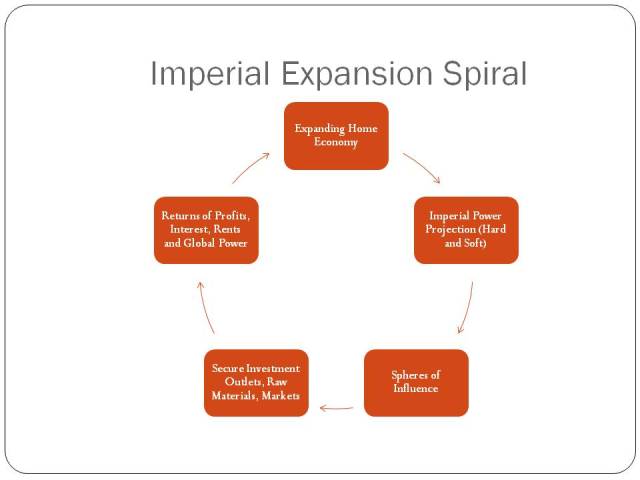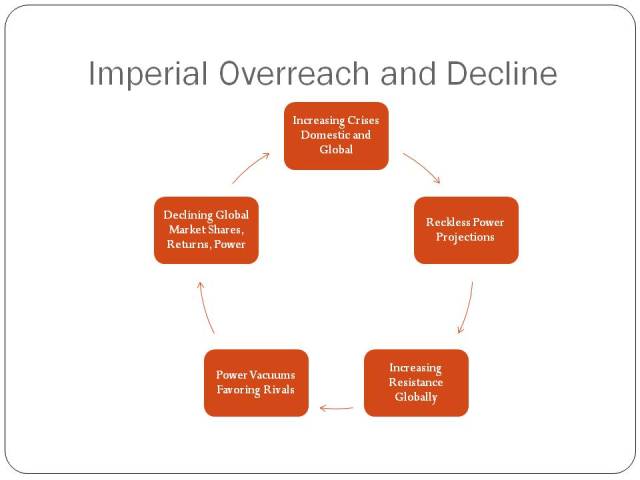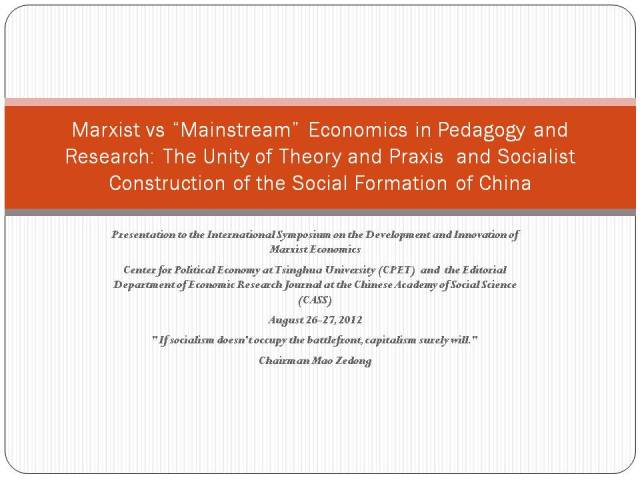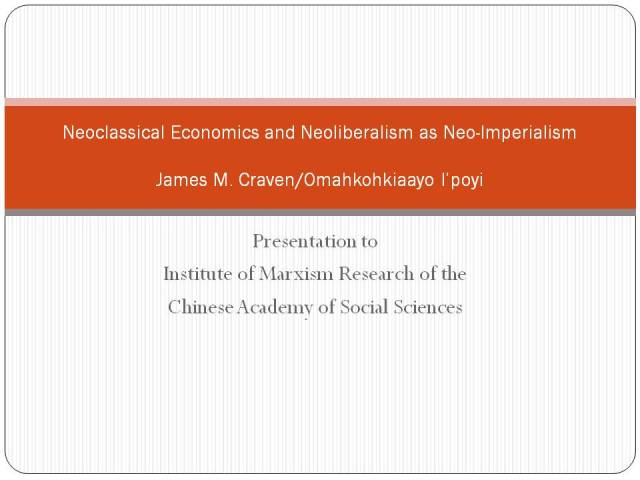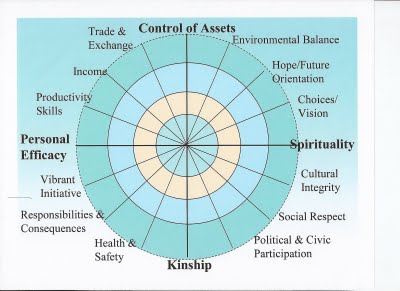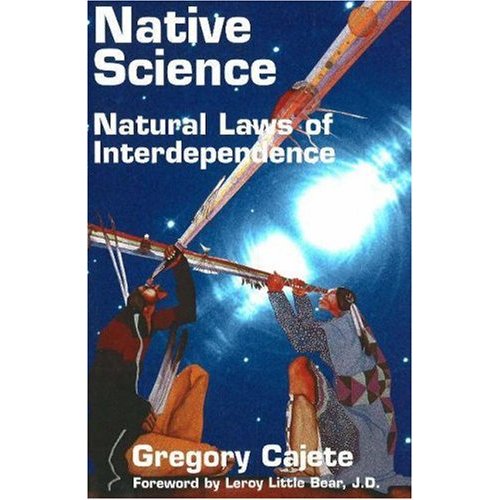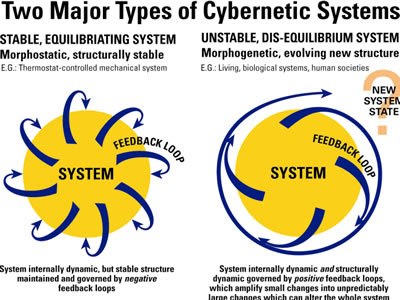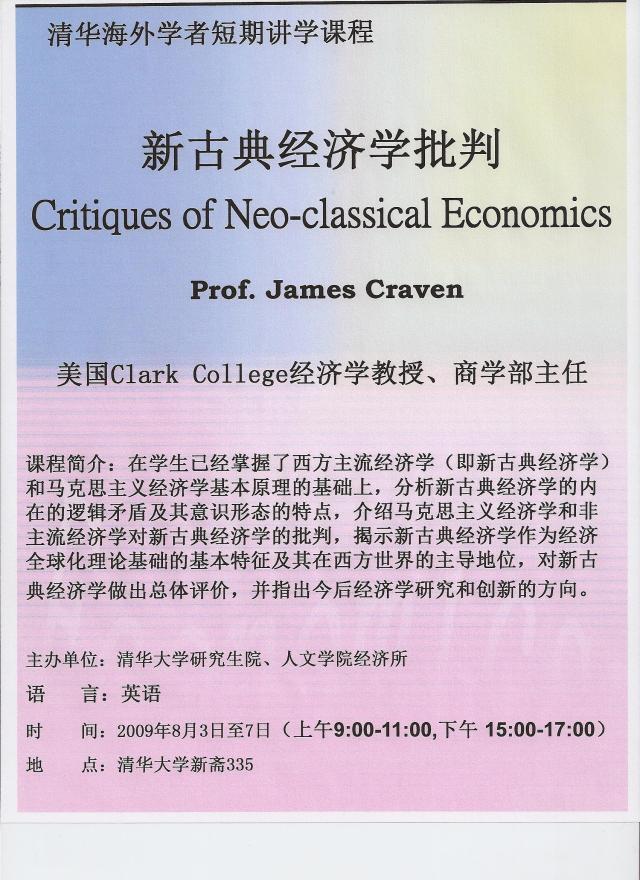These core imperatives of capitalism form the core “logic” of the System driving it. But the imperative for lowering COSTS to PRODUCE Surplus Value compromises the [also] MASS INCOMES needed to buy and REALIZE the embodied potential profit. Thus MASS production outstrips MASS consumption; and GREED and SELFISHNESS show up in the workplace not only in the places of conspicuous debt-fueled consumption
Imperial Expansion Spiral Fed by Core Imperatives and Expansionary “Logic” of Capitalism
Contractionary and Decline-Decay Spiral of Imperialism driven by Core Imperatives and “Logic” of Capitalism in Late-Phase Stages
Presentation at Tsinghua Aug 2012
The Theoretical System and Predictions of Karl Marx and Friedrich Engels: A Compendium of Assumptions, Postulates and Predictions
By James M. Craven/Omahkohkiaaiipooyii
Presentation to the International Symposium on the Development and Innovation of Marxist Economics Center for Political Economy at Tsinghua University (CPET) and Editorial Department of Economic Research Journal at the Chinese Academy of Social Science (CASS) August 26-27, 2012
“If socialism doesn’t occupy the battlefront, capitalism surely will.” Chairman Mao Zedong
ABSTRACT
This paper, and presentation based upon it, explores the theoretical system of Marx and Engels as an integrated and largely coherent system of theory and praxis from which Marx made a compendium of definite and testable predictions about the logic, dynamics and trajectories of capitalism; it is important to be clear as to what Marx and Engels really wrote and argued. These predictions, one of the tests of theory and its application, are identified and sourced. Also presented in this paper and presentation are: a) some of the essential differences between Marxist versus Neoclassical or “mainstream” economics; b) some recurring and failed attempts to rescue Neoclassical economics from its own contradictions and failures in prediction and applications via policy; c) some suggestions on future approaches, modeling and projects in pedagogy and research in political economy based on Marxism and applied to the concrete conditions and realities of China. KEYWORDS: Marxist Economics, Neoclassical or Mainstream Economics, Compendium of Predictions, Pedagogy, Current Global Crises.
Theoretical System of Marx and Engels, completed and proofed.(3) pdf
Neoclassical Economics and Neoliberalism as Neo-Imperialism (2)slide show
Sunday, February 27, 2005
The Evolving Concept of Social Capital, Markets, Market-Based Processes and Socialist Construction
Paper delivered Sept 1-2, 2004 at the International Symposium on the Reform of Property Rights and Enterprise Development in Transitional Countries at Tsinghua University, Beijing, China
The Evolving Concept of Social Capital, Markets, Market-Based Processes and Socialist Construction
By James M. Craven (Blackfoot Name: Omahkohkiaaiipooyii)
Professor, Economics; Chairman, Business Division, Clark College, Vancouver, WA.
“Every nation in the world has its own history and its own strengths and weaknesses. Since earliest times excellent things and rotten things have mingled together and accumulated over long periods. To sort them out and distinguish the essence from the dregs is a difficult task…Of course this does not mean that we do not need to learn from foreign countries. We must learn many things from foreign countries and master them…We learn foreign things because we want to study and develop Chinese things…We must not be like the Empress Dowager Tz’u-hsi who blindly rejected all foreign things. Blindly rejecting foreign things is like blindly worshipping them. Both are incorrect and harmful…In learning from foreign countries we must oppose both conservatism and dogmatism…To study foreign things does not mean importing everything, lock, stock and barrel…We must give our attention to the critical acceptance of foreign things, and especially to the introduction of things from the socialist world and from the progressive people of the capitalist world…”
(Chairman Mao Zedong, “Talk to Music Workers”, pp. 85-88, in Chairman Mao Talks to the People: Talks and Letters 1956-1971, Stuart Schram ed., Pantheon Books, N.Y. 1974)
Evolving Concept of Social Capital Markets and Socialism pdf
Indigenous Approaches to Economic Development: Lecture Given at Yunnan University, Kunming, China, July 25, 2009
Indigenous Approaches to Economic Development and Sustainability
–
Lecture/Paper Delivered to the Faculty of Anthropology and Ethnology, Yunnan University, Kunming, China, July 25, 2009
–
By James M. Craven/Omahkohkiaaiipooyii
–
Professor of Economics and Geography, Clark College, Vancouver, WA. USA
–
Member, Blackfoot Nation
Indigenous Approaches to Economic Development and Sustainability
Many of the core principles and approaches of Indigenous science are as much or beyond what passes for Eurocentric “Mainstream Science” and parallels in many ways the basic principles of Marxist epistemology.
Indigenous Epistemology and Science: Some Parallels and Contrasts with Neoclassical Theory(NT), Chaos Theory(CT) and Dialectical-Materialism(DHM)
Indigenous Epistemology and Science: Some Parallels and Contrasts with Neoclassical Theory (NT), Chaos Theory (CT) and Dialectical-Historical Materialism (DHM)
Presented at the 16th Congress of the IUAES, Kunming, China July 26-31
By James Craven/Omahkohkiaaiipooyii
“If the construction of the future and its completion for all time is not our task, all the more certain is what we must accomplish in the present; I mean, the ruthless criticism of everything that exists—the criticism being ruthless in the sense that it neither fears its own results nor fears conflict with the powers that be.”
(Karl Marx, from Letter to Arnold Ruge, 1843)
Indigenous Epistemology and Science
Neoclassical theory treats capitalism and markiets as morphophostatic systems (self-generating/stabilizing/sequilibrating/renewing/reproducing/expanding) whereas human history and the present shows them as morphogenetic systems subject to both + and – feeback loops and thus dynamic instability
The Survival and Sustainability of the Blackfoot Nation and Culture
By James Craven/Blackfoot Name: Omahkohkiaaiipooyii
Professor of Economics and Geography, Clark College, Vancouver Washington
Presented at the 16th Congress of the IUAES, Kunming, China July 26-31
The Past [is] Alive in the Present [and] Shaping the Future
“Who controls the past controls the future. Who controls the present controls the past.” (George Orwell).
When we speak of the survival and sustainability of Blackfoot “Culture”, we are speaking of more than the survival and sustainability of the Blackfoot Nation and people who are the primary creators, definers, carriers, learners, transmitters and expanded reproducers of that nation and culture. We are also speaking about the survival and sustainability of the potential energy and influences—even on other cultures—embodied in and transmitted by that culture. And since all culture is dynamic and never static, we are also speaking of the survival and sustainability of all that it takes for Blackfoot culture to grow, adapt to new challenges and new conditions, and, to continually challenge itself and its own traditions and sacred practices and assumptions, some of which are functional and worth keeping, and some dysfunctional and not worth keeping. That means that the survival and sustainability of what is left of the Blackfoot nation and culture, as with other Indigenous nations, nationalities and cultures also on the brink of total extinction, means dealing not only with conditions, practices, forces and interests nominally “endogenous” or internal to the Blackfoot nation and culture that may threaten it, but also it means dealing with those forces and interests, historical and present-day, that are nominally “exogenous” or external to the Blackfoot nation and culture, that have threatened, and still threaten to this day, its survival and sustainability.[1]
As with any individual, so it is with any nation, that history is never really past and dead; it lives within, constrains and shapes, the present and thus also the future. This does not mean that individuals or whole nations cannot transcend the constraints of history, but they ignore them, or engage in historical revisionism, at their own peril. To understand and deal with the past, and the extent to which it is embodied in and thus constraining, the present and future, it is imperative that an honest examination and accounting, with no equivocation, and without fear or favor to anyone, of that past—and present shaped by that past—be done. Otherwise it is like someone going to see a physician or lawyer for help but not being honest and forthright about what practices in the past led them in the present to be in crisis and thus to need and seek help.
–
The Survival and Sustainability of the Blackfoot Nation and Culture
Notice for my graduate course on Critiques of Neoclassical Economics
5th Forum of the World Association for Political Economy
THE CRISIS OF CAPITALISM AND ITS SOLUTION: SOCIALISM OF THE 21ST CENTURY
MAY 29-30, 2010 SUZHOU, CHINA
CRITIQUES OF NEOCLASSICAL ECONOMICS: AN EXAMINATION OF SOME OF THE CRITIQUES OF STEVE KEEN
img256
(ENGLISH VERSION)
img257
(CHINESE VERSION)


![These core imperatives of capitalism form the core "logic" of the System driving it. But the imperative for lowering COSTS to PRODUCE Surplus Value compromises the [also] MASS INCOMES needed to BUY and REALIZE the potential profit. Thus production outstrips consumption; and GREED and SELFISHNESS show up in the workplace not only in the places of conspicuous debt-fueled consumption](http://jimcraven10.files.wordpress.com/2012/09/slide12.jpg?w=640&h=480)
